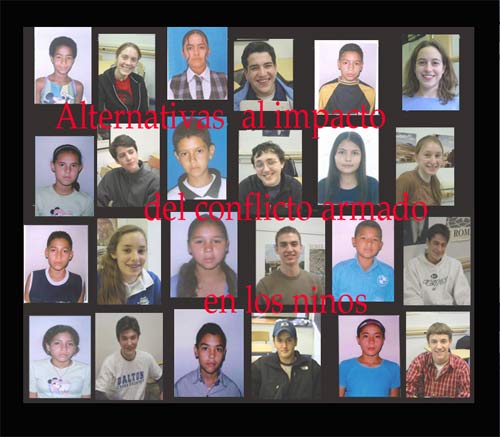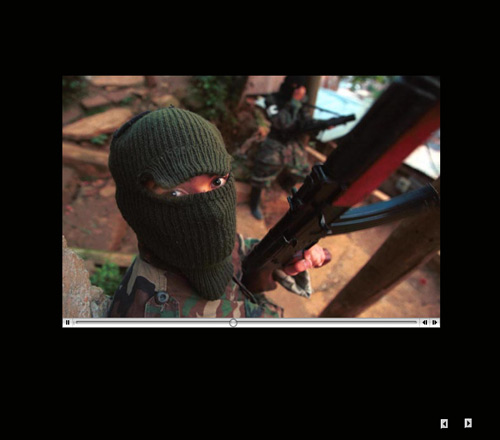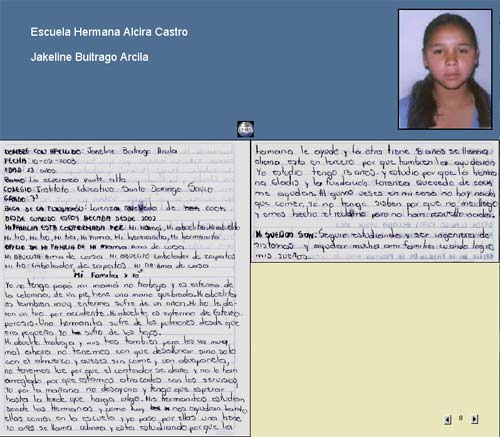« Ivanhoe: An Online Playspace For Collaborative Interpretation | Main | ICONS: Simulating the Game of Global Politics Online »
August 29, 2005
The Colombia Project: A Portable Mini-Language Lab

![]()

Until recently, the use of technology in language labs didn't go much further than pre-recorded audio to introduce the vernacular of native speakers, or a videotape to contextualize cultural issues. These canned, artificial products often presented generalized or stereotyped notions of life in foreign countries and rarely addressed harsh realities such as war, poverty, and internal displacement. Student interaction with these objects was equally artificial and seldom involved critical thinking or personal introspection.
Sol Gaitan, a high school teacher at the Dalton School in Manhattan, has found a way to use multiple media to create a learning environment for the foreign language classroom that goes well beyond the traditional language lab. Her mini-lab exists within a composite assignment for her Advanced Spanish IV class. According to Ms. Gaitan, "the project targets the multiple language skills involved in the process of learning a foreign language." The project, built in TK3, employs images, sound, live links, and annotated text to increase student investment and add depth and complexity to the language lab experience.
The framework for the project asks Dalton students to consider the impact of war on children in Colombia. An opening slideshow includes photographs that highlight the harsh reality of guerilla warfare in order to introduce Dalton students to the daily conditions faced by children living in these areas.

To prepare this project, Ms. Gaitan visited a school in Medellin, Colombia's second largest city. This particular school is located on the outskirts of Medellin, and is populated by people who have been displaced by war.
Ms. Gaitan asked the Colombian students to write essays about their lives. She took these handwritten documents back to New York to share with her students. The mini-biographies were scanned and incorporated into separate digital books. Each Dalton student received an essay written by a different Colombian student. They began the lab assignment by reading these short biographies, deciphering the handwritten text, and re-writing the essays in Spanish, correcting grammar and orthography.

Once the essays were properly transcribed, students were assigned the task of translating them into English. Spanish and English versions were presented in parallel columns in the TK3 book, with a scrolling image of the primary source at the top of the page.

Students were then asked to think deeply about the material and to write an analytical essay addressing the impact of war and displacement on adolescents whose circumstances are different from their own. These essays were written in Spanish and added to the TK3 books. Students also produced short, improvised oral reactions to what they learned in the assignment. These oral exercises were recorded and included in their TK3 books. This year, Ms. Gaitan asked the students to produce dialogs instead of monologs. She found that dialogs, "gave the oral part a much more 'real' and impromptu character." She further improved the project by renaming it to emphasize the personal nature of the exploration:
The second time around, I called the project 'Reflexion/Reflejo. Vidas paralelas' and asked the students to see their Colombian counterparts as a mirror upon which they saw themselves, as a reflection (reflejo,) and then to write down their reflections (reflexion.) Their writing is much more personal than those of the previous year. The final pieces, complete with the dialogs, are sort of parallel lives (vidas paralelas.) Language, history and culture internalized this way, become intimate.

Instructor Sol Gaitan had this testimony about the success of the project.
Reading original manuscripts has exposed them to vernacular Spanish spoken by children their age in a way that printed text could never achieve. They have also realized how much Spanish they know, and how correct it is. They are thrilled to be authoring a little book on a topic on which they are becoming experts, thanks to the easy and direct access to the Internet provided by links created by me in the introductory material. For me, as language teacher, the icing on the cake is to have their oral commentary documented. This will allow me to assess each student's pronunciation patterns, fluency, and ability to improvise.
Posted by kim white at August 29, 2005 11:43 AM
